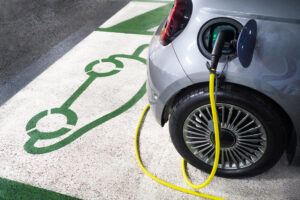
EV legislation: Sale restrictions, fees & tax credits
By onBusiness Practices | Market Trends
Bills making their way through the Mississippi and Montana legislature would put restrictions or fees on electric vehicles (EVs).
The Mississippi bill, HB 401, seeks to prohibit automakers from operating their own brick-and-mortar businesses to sell their vehicles, which would prevent EV OEMs, such as Tesla, Rivian, and Lucid from selling their own vehicles. It would require their vehicles to be sold through an independent dealer or franchise.
Tesla already operates a sales location in Brandon, Mississippi. It was approved for operation by the Motor Vehicle Commission after the state’s attorney general provided the opinion that doing so wouldn’t violate Mississippi’s franchise law for the automaker to have manufacturer and dealer licenses. If HB 401 passes, Tesla will be allowed to keep its existing storefront but wouldn’t be able to open any others.
Rivian is actively lobbying against HB 401.
“This is a critical issue to us, to a handful of other companies in the electric vehicle space,” said Beau Whiteman, Senior Policy Advisor at Rivian, told the Clarion Ledger. “The current franchise-dealer model was set up 100 years ago, and really kind of formalized post-World War Two, and we should be very clear Rivian, Tesla and the handful of other companies that are in the space, we are not running around out here advocating for the end of this system. We simply don’t want to be a part of it ourselves. Our business model does not align with it.”
The bill states that manufacturers, distributors, and their branches or subsidiaries cannot “own any ownership interest in, operate or control any motor vehicle dealer or dealership in this state for the same type or classification of motor vehicle that it manufactures or distributes.”
They would also be barred from getting a new vehicle dealer license. Bill sponsor Sen. Daniel Sparks (R-Belmont) recently told the Senate Finance Committee the bill enforces the franchise laws of the state.
“These laws were enacted in July of 1970 so for 53 years, almost, this has been the process,” he said. “There is not anything in this bill that would prevent the direct sale of a new motor vehicle from a manufacturer to a customer via the internet.”
He added that he disagrees with the attorney general’s opinion on the law regarding the operation of manufacturer-owned storefronts.
The bill passed 105-9 in the House and made it through the Senate Finance Committee.
In Montana, lawmakers want to establish an additional vehicle registration fee on EVs and plug-in hybrid electric vehicles (PHEVs) based on weight ranging from $130-$1,100. The fee when renewing EV and PHEV registrations would cost owners between $70 and $700. The fees would help pay for road maintenance and construction in the state.
HB 60 was passed by the House and on first reading in the Senate. In 2021, the legislature approved a bill to add a new annual fee on all-electric vehicle registrations but Gov. Greg Gianforte vetoed it.
Bill sponsor Rep. Denley Loge (R-District 14) told the House Appropriations Committee the state’s gas tax will have to be raised or another revenue source would have to be found to pay for state roads but that his bill could “stave that off.”
A report from the Transportation Interim Committee states that, as of January 2022, there were 2,895 light-duty EVs registered in Montana, including 1,893 battery electric vehicles (BEVs) and 1,002 PHEVs.
At the federal level, EV automakers are starting to work around a $7,500 point-of-sale tax credit for manufacturers included in the Inflation Reduction Act (IRA).
Business Insider reports that Lucid has emailed reservation holders to let them know they would receive $7,500 off the price of their vehicle if they lease it through Lucid Financial Services.
“By taking advantage of this savings, customers get a lower monthly payment for their new Lucid Air,” the email states, according to Business Insider.
Loren McDonald, EV analyst and founder of research site EVAdoption, told Business Insider the purpose of the tax credit could be negated if foreign OEMs find a loophole to claim the credit. The IRA provides the greatest tax incentives for vehicles assembled in North America, and with a large percentage of battery components made or assembled in North America.
“That opens up everything from the Lucid to the GMC Hummer to Mercedes to Hyundai, Kia, et cetera, that are disqualified for some reason,” he said. “My expectation is that many of the non-US manufacturers will start offering this.”
A spokesperson for Ford’s financial services arm, Ford Credit, told Automotive News that it can claim the tax credit on qualifying EVs that it owns and leases, but that “these are competitive decisions that we won’t discuss publicly.”
Images
Featured image credit: boschettophotography/iStock
